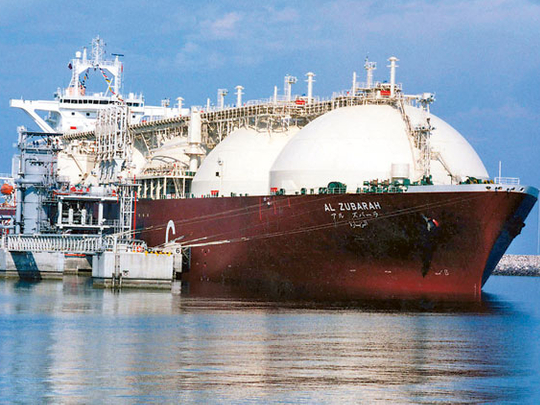
Dubai: Qatar, the world’s biggest exporter of liquefied natural gas, will pay less for $4 billion (Dh14.7 billion) than any other sovereign issuing Islamic bonds.
The government priced five-year sukuk to yield 115 basis points more than the benchmark midswap rate, or about 2 per cent, two people familiar with the transaction said on Wednesday.
The 10-year notes were sold at 155 basis points over midswaps, or about 3.2 per cent, they said. That’s below the 3.56 per cent average yield of 12 constituents in the HSBC/Nasdaq Dubai Sovereign US Dollar Sukuk Index.
Qatar in November sold non-Shariah compliant bonds due in January 2022 at 4.63 per cent.
Demand for the debt continues to outstrip supply even as global sales are off to a record start this year, according to Credit Agricole CIB.
The $196 billion economy of Qatar, the world’s richest country based on per-capita income, will expand 6.1 per cent this year, the most among the six-nation Gulf Cooperation Council, according to the median forecast of 11 economist compiled by Bloomberg. The nation is rated AA at Standard and Poor’s and Aa2 at Moody’s Investors Service, the third-highest investment grades.
“There isn’t a large number of highly rated sovereign sukuk out there,” Abrar Hussain, the Dubai-based head of debt capital markets for the Middle East at Credit Agricole, said on Monday.
“Bond issuers that typically issue conventional debt are looking for ways to issue sukuk. Qatar may save itself a few basis points with a sukuk sale as other issuers have managed to do.”
Boosting sales
Islamic borrowing costs, which are approaching all-time lows, are encouraging governments and companies to tap the market, resulting in sales of $21.5 billion this year excluding Qatar, data compiled by Bloomberg show. Emaar Properties PJSC, the developer of the Burj Khalifa in Dubai, said on Tuesday it may tap the sukuk market for the first time in more than a year as it hired banks to arrange investor meetings in London.
The average yield on sovereign sukuk has declined 34 basis points in 2012 to 3.56 per cent, according to the HSBC/Nasdaq index. That is 124 basis points lower than the average yield of 4.80 per cent on debt in the euro region, according to the JPMorgan Chase and Co. EMBIG Europe Sovereign Yield index.
The five-year US midswap rate, which is used as a benchmark for sukuk pricing, was at 0.8685 per cent on Wednesday, near the lowest level since at least 1988.
Qatar last issued Islamic bonds in 2003, when it raised $700 million from seven-year securities. The government last November sold $5 billion, the biggest issue from the Arabian Gulf in 2011, of dollar-denominated non-Islamic bonds maturing in five, 10 and 30 years. Qatar sold securities due in January 2017 to yield 3.18 per cent and notes maturing in January 2042 at 5.83 per cent, according to data compiled by Bloomberg.
Setting records
The yield on the 2017 notes has fallen 81 basis points so far this year to 2.1 per cent on Wednesday, while the rate on the bonds due 2022 was at 3.22 per cent.
Qatar sold $2 billion of five-year sukuk and $2 billion of 10-year securities, the two people, who asked not to be identified because the details are private, said on Wednesday. The five-year sukuk will also yield about 193 basis points less than Malaysia’s 3.928 per cent Islamic bonds, according to Bloomberg’s calculations. Malaysia is home to the world’s biggest sukuk market.
Dubai was the last government in the GCC to sell dollar-denominated sukuk when it raised $1.25 billion in April. The yield on its 6.396 per cent sukuk due November 2014 has fallen 207 basis points this year to 3.5 per cent today. The extra yield investors demand to hold Dubai’s notes over Malaysia’s 3.928 per cent bonds narrowed to 163.
Europe’s lifeline
Still, Qatar remains vulnerable to the fallout from Europe’s credit crisis. Five Eurozone nations have already sought international bailouts, and European governments this week agreed to jump-start as much as 100 billion euros (Dh450 billion) in emergency loans for Spain’s banks to help to shield the euro region’s fourth-largest economy from the debt crisis.
Qatar, home to 1.7 million people, plans to spend about $130 billion to host the 2022 football World Cup. The government is set to build a $35 billion rail and metro line, a $7.4 billion port, new roads and stadiums. The economy grew 18.8 per cent last year, almost three times faster than Saudi Arabia’s, the Arab world’s largest, according to data compiled by Bloomberg.
Seeing demand
Standard Chartered Plc, Deutsche Bank AG, HSBC Holdings Plc, Barwa Bank and QInvest LLC arranged Qatar’s sale. The country will use state-owned buildings and land as underlying assets for the sale, S&P said this week.
The nation’s Islamic bond offering will see “a lot of demand” because investors are favouring investment-grade bonds from the Gulf and a shortage of sukuk is at the same time driving down yields, according to SJS Markets Ltd. before the pricing today.
“Because of the problems in Europe, investors are looking for securities in the Middle East, so Qatar will be in high demand,” Samer Mardini, vice-president of fixed-income and Islamic finance products at Dubai-based SJS Markets, said on Tuesday. “The current pricing is fair. It’s tight, but it’s a strong credit, and the pricing is in line with where its bonds are trading right now.”












